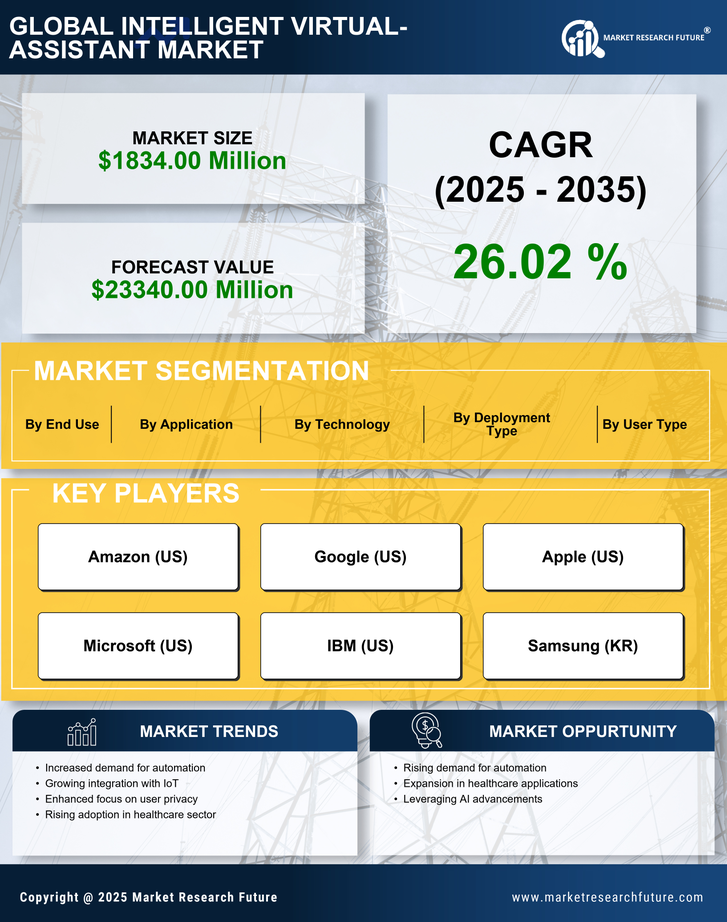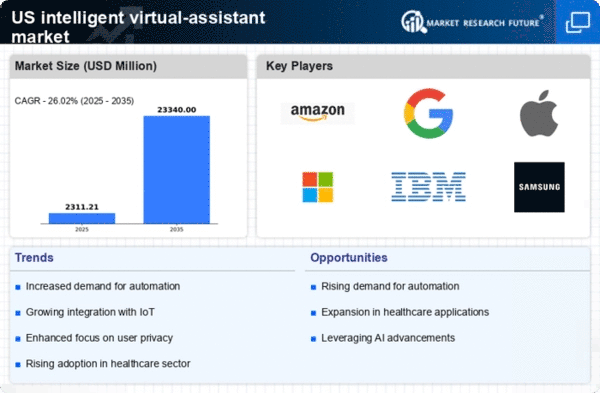Integration with IoT Devices
The integration of intelligent virtual assistants with Internet of Things (IoT) devices is transforming the landscape of the intelligent virtual-assistant market. As smart home technology becomes more prevalent, consumers are increasingly utilizing virtual assistants to control various devices, from thermostats to security systems. This integration not only enhances user experience but also drives market growth, as it allows for seamless interaction between users and their devices. In fact, it is projected that by 2026, the number of connected IoT devices in the US will reach approximately 30 billion. This proliferation of devices creates a fertile ground for the intelligent virtual-assistant market to thrive, as users seek more intuitive and efficient ways to manage their smart environments.
Rising Demand for Automation
The intelligent virtual-assistant market is experiencing a notable surge in demand for automation across various sectors. Businesses are increasingly recognizing the potential of virtual assistants to streamline operations, enhance productivity, and reduce operational costs. According to recent data, automation can lead to a reduction in labor costs by up to 30%, making it an attractive option for companies looking to optimize their resources. This trend is particularly evident in customer service, where virtual assistants can handle inquiries efficiently, allowing human agents to focus on more complex tasks. As organizations continue to seek innovative solutions to improve efficiency, the intelligent virtual-assistant market is likely to expand significantly, driven by the need for automation in everyday business processes.
Increased Focus on Customer Experience
An increased focus on customer experience is a pivotal driver in the intelligent virtual-assistant market. Companies are recognizing that enhancing customer interactions can lead to higher satisfaction and loyalty. Virtual assistants play a crucial role in this strategy by providing instant support and personalized recommendations. Data suggests that businesses that prioritize customer experience can achieve revenue growth of up to 10% annually. As organizations strive to differentiate themselves in competitive markets, the intelligent virtual-assistant market is likely to benefit from this emphasis on improving customer engagement. By leveraging virtual assistants, companies can create more meaningful interactions, ultimately fostering stronger relationships with their customers.
Advancements in Natural Language Processing
Advancements in natural language processing (NLP) technology are significantly impacting the intelligent virtual-assistant market. Enhanced NLP capabilities enable virtual assistants to understand and respond to user queries with greater accuracy and context awareness. This improvement is crucial for user satisfaction, as it allows for more natural interactions. Recent studies indicate that 70% of users prefer voice-activated assistants that can comprehend complex commands. As NLP technology continues to evolve, it is expected that the intelligent virtual-assistant market will witness increased adoption, particularly in sectors such as healthcare and finance, where precise communication is essential. The ability to process and analyze language effectively positions virtual assistants as indispensable tools in various industries.
Growing Consumer Preference for Voice Interaction
The growing consumer preference for voice interaction is reshaping the intelligent virtual-assistant market. As users become more accustomed to voice-activated technology, the demand for virtual assistants that can facilitate hands-free interaction is on the rise. Research indicates that approximately 50% of all searches are expected to be voice-based by 2026, highlighting a significant shift in user behavior. This trend is particularly pronounced among younger demographics, who favor the convenience of voice commands over traditional input methods. Consequently, businesses are increasingly investing in voice-enabled virtual assistants to meet consumer expectations, thereby driving growth in the intelligent virtual-assistant market. This shift towards voice interaction is likely to influence product development and marketing strategies in the coming years.
















